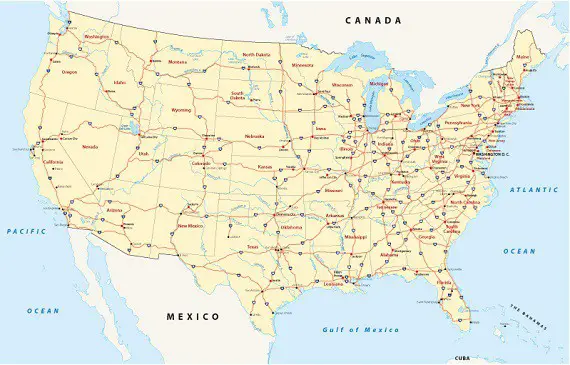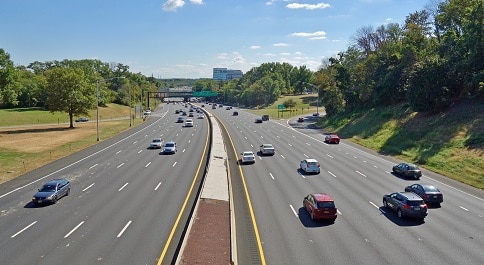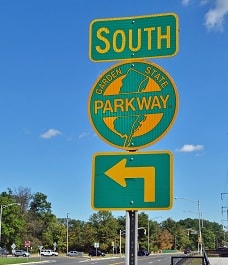Although the Garden State Parkway does have vehicle restrictions, especially north of Exit 105. Due to their relatively small weight, a cargo van is allowed to be driven on the entire length of the parkway. North of Exit 105, the restriction prohibits commercial vehicles weighing over 7,000lbs.
Cargo Van Are Not Too Big and Heavy
A cargo van is compact and smaller than most other types of van. Its compact design allows for access to the cargo area directly from the driver’s position but also has doors on its side and at the rear. It is not as powerful as many other trucks or vans, but this is an advantage when it comes to restrictions on certain highways, including the Garden State Parkway.
The weight of an average cargo van is 2,500lbs, and so even when laden, they fall beneath the weight restrictions on most highways. This means that a cargo van is often considered to be an ideal freight vehicle for smaller or lighter loads, as it will not confront any restrictions on highway use anywhere in the country.
Using a cargo van for freight deliveries across the country can also saves fuel costs. Due to its smaller size and less powerful engine, a cargo van is very fuel efficient. Although they may not be as fuel efficienct as the average sedan, it isn’t much higher and is certainly more fuel efficient than most other vans or trucks.
Cargo Vans Are Allowed on Highways
It is perhaps due to cargo vans being permitted on state highways that large companies such as DHL, UPS and even U-Haul boast cargo vans among their fleets of vehicles.
In many instances, the main state highways provide the shortest and most direct routes across the country and even within states. Being able to use these highways saves fuel and timeon deliveries.
That added to the fuel efficiency of cargo vans can make delivery costs cheaper.
Many US Highways Have Different Rules

The highway systems in the United States cover a total of 4.1 million miles on which 85% of all freight is transported around the US. These highways also account for 82% of personal travel throughout the country.
Although these highways are termed as US Highways, less than 200,000 miles of them are actually controlled by the Federal Government.
The other nearly 4 million miles of highway are built, maintained, and regulated by the individual states.
The Federal government does however dictate certain minimum standards and will help a state financially if those standards are met.
Most of the highways which the Federal Government is actually responsible for are on either reservations or military bases.
State Highways Have Their Own State’s Rules
Each state has to maintain its own highways, and as the Federal government requires that these highways pay for their own maintenance, many of them have tolls.
As well as setting tolls on state highways, the state may also implement restrictions on which vehicles can use them and when. The state may also set speed limits on all or parts of different highways within their jurisdiction.
Restrictions
Although commercial vehicles weighing more than 7,000lbs are allowed to use the parkway south of exit 105, an extra toll fee may have to be paid to initially enter the Parkway. North of exit 105 though these heavier commercial vehicles are completely banned from using the parkway and may be referred to as “Misplaced Vehicles” by the state transport authorities.
The driver of these misplaced vehicles may face a fine of as much as $500 or 30 days in jail and in some instances, both.
Updating Restrictions
From time to time states will review the restrictions which they have placed on their State Highways. However, the restrictions which apply to the Garden State Parkway north of exit 105 are unlikely to be changed in the foreseeable future.
In 2011 the New Jersey transportation authority reviewed lifting the restrictions. At that time though lifting of the restrictions was deemed inappropriate, due to some low overpasses and the construction of the road not being suitable for heavier loads.
It will therefore take some major infrastructure improvements before restrictions north of exit 105 can be removed.
Garden State Parkway

The Garden State Parkway is the longest highway in New Jersey. Although the parkway, which was named after the State’s nickname is always shown on highway signs as being the Garden State Parkway, its official designation is State Route 444.
The Parkway stretches for 172 miles from Cape May in the south and ends in Montvale in the north at the New York State boundary. In 2005 the Parkway was the busiest highway in the US and still today remains as one of the busiest.
Building of the Parkway was completed in 1954 and although prior to that no tolls were planned, today it has 11 toll plazas along its length plus some extras at certain exits and entrances. Providing fuel and food there are 11 service stations along the Parkways route. During the Parkways history there have also been 10 picnic areas but today only one remains.
The speed limit on most of the Parkway is 65mph however in places this is reduced to 55mph and even 40mph in places. The New Jersey State transport authority maintains the right to change these limits as necessary and so you should watch out for the speed signs.
Whilst there are toll booths along the entire length of the Garden State Parkway it can be experienced toll free on certain sections. These sections include from Exit 129 to Exit 140, Washington Avenue to Jimmie Leeds Road and the Atlantic City Expressway to Tilton Road.
In 1961 the Garden State Parkway saw a large number of accidents involving motorcycles which led to a ban on motorcycles, scooters or bicycles from using any part of the Parkway. This ban however was lifted in 1975 due to pressure from a growing number of people.
Garden State Parkway Provides a Less Stressful Driving Experience
The advantages of being able to use the full length of the Garden State Parkway go beyond just time and expense. On constructing the Parkway, designers took into account that long stretches of straight road can lead to drivers feeling drowsy.
To avoid this happening, the Parkway designers built the road with numerous, gentle curves to help the drivers maintain concentration.
As a further safety measure, the designers ensured plenty of trees were planted between the north and south direction lanes. This abundance of trees helps to avoid glare from the lights of oncoming traffic at night.
To help ensure drivers on the Parkway have as pleasant an experience as possible, the New Jersey traffic department ensures that all billboards along its route blend in better with their surroundings.
Conclusion
Cargo vans are gaining popularity as both personal vehicles and as commercial vehicles. Part of this popularity is due to their relatively favorable fuel efficiency. Also their popularity may be to the lack of restrictions on which highways they can be used on compared to larger vans and trucks.
Obviously when planning any trip either for personal or business purposes, finding the most efficient route can cut costs and time. This means that any restrictions on the route you choose could delay your arrival quite considerably.
Prior to setting out, you should therefore check any state transportation regulations for the states you intend to drive through. This is where a cargo van is most beneficial as few states restrict their use on any highways, allowing you to avoid any detours to your planned route.
The Garden State Parkway stretches north to south in the eastern part of the state but west of Atlantic City. This makes it very popular with people for commuting or personal travel.
If not for the restrictions, it would also be a popular freight route. It is however perhaps the restrictions on the heavier commercial vehicles which make it as popular as it is for personal travel.
If you plan to travel through New Jersey either on a regular basis or occasionally, you will appreciate having a cargo van instead of a truck or larger van.
If you do have more freight than can fit in your cargo van, you could consider towing a trailer.
The restrictions north of Exit 105 allow for non-commercial vehicles to tow a trailer provided their combined length does not exceed 45 feet.


